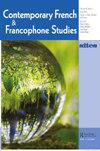The Revolutionary Sublime: Hegel, Fanon, and the Fanatical State
IF 0.2
4区 文学
0 LITERATURE, ROMANCE
引用次数: 0
Abstract
ed from the speculative impulse of thought and corresponding contingency of the real. The encounter with the colonizer dialectically interpellates the colonized, animating her “signs” of resistance. Revealing through their dynamic alterity, real or imagined, the dialectical instability and thus revolutionary impetus internal to the Enlightenment and its secular legacy, Muslims in the colonial period and in the West today mark precisely what “secularism” cannot acknowledge as inherent in its system: the fundamental sublimity and violent articulation of its signifying regimes. Dogmas of the “understanding”—prescribing, for instance, the liberation of the Muslim woman through laïcit e—mystify that sublimity and violence, repressing knowledge of the always latent potential and actuality of fanaticism and terror by the European state since the French Revolution. As Fanon points out, “fanaticism” and “terror” can be attributed far more aptly to European coloniality than to decolonial insurgency: as examples, Fanon cites the elision of the distinction between the white civilian and military sectors in Algeria; the license granted to the entire settler population—numbering hundreds of thousands—to kill Muslims with impunity; and the systematic torture, rape, and murder of Algerian women. The resulting “terror” consumes colonial society: [The French state decrees that] henceforth all Europeans will be armed and should fire on anyone who appears suspect. The savage, iniquitous repression bordering on genocide must above all be prosecuted by the authorities, according to general opinion. Lacoste [the governor-general] replies: Let us systematize the repression, let us organize a manhunt for Algerians. And symbolically he gives civilian powers to the military, and military powers to the civilians. The circle is closed. In the middle is the Algerian, disarmed, starved, hunted, jostled, beaten, lynched, soon to be shot as a suspect. Today, in Algeria, there is not a single Frenchman who is not authorized or welcome to use his weapon [to kill], who does not have permission or the obligation to find, provoke, and pursue suspects. The unblinking and, for Hegel, ultimately “religious” fanaticism of such programmatic terror in the name of “freedom”—continuous with Robespierre— initially intensifies when confronted with the sublime disarticulation of the colonial dialectic. In this vein, the “terror” unleashed by the state gives rise to “terrorism,” even if in relatively meeker forms, on the part of the colonized as a dialectically inevitable response. As the distinction between European and Muslim appear and disappear through the endless “grand battle” of signification, the evidently contingent and arbitrary “limits” of the colonial project continue to dissipate: The adversary now knew, as certain militant women had spoken under torture, that women with a very Europeanized aspect were playing a fundamental role in the battle. Moreover, certain European women of Algeria were arrested—to the dismay of the adversary, who realized that his own system was breaking down. The discovery by the French authorities of the participation of Europeans in the liberation struggle marks a turning 126 H. LADHA革命的崇高:黑格尔、法农与狂热国家
源自思辨的思维冲动和现实的相应偶然性。与殖民者的相遇辩证地审问着被殖民者,激发了她反抗的“迹象”。殖民时期和今天西方的穆斯林通过他们的动态交替,无论是真实的还是想象的,揭示了启蒙运动及其世俗遗产内部的辩证不稳定和革命动力,恰恰标志着“世俗主义”无法承认的内在制度:其象征性政权的根本崇高和暴力表达。“理解”的教条——例如,规定通过laïcite解放穆斯林妇女——使这种崇高和暴力神秘化,压制了人们对法国大革命以来欧洲国家狂热和恐怖的潜在潜力和现实的认识。正如法农所指出的,“狂热主义”和“恐怖”可以更恰当地归因于欧洲殖民主义,而不是非殖民化叛乱:例如,法农引用了省略阿尔及利亚白人文职和军事部门之间区别的例子;授予数十万定居者杀害穆斯林而不受惩罚的许可证;以及有系统地折磨、强奸和谋杀阿尔及利亚妇女。由此产生的“恐怖”吞噬了殖民社会:[法国国家法令]从今以后,所有欧洲人都将携带武器,并应向任何看起来可疑的人开火。根据普遍意见,当局首先必须起诉近乎种族灭绝的野蛮、不公正的镇压。拉科斯特(总督)回答说:让我们将镇压制度化,让我们组织对阿尔及利亚人的追捕。象征性地,他将文官权力赋予军队,将军事权力赋予平民。圆圈是闭合的。中间是阿尔及利亚人,他们被解除武装,挨饿,被追捕,被推搡,被殴打,被私刑处死,很快就会作为嫌疑人被枪杀。今天,在阿尔及利亚,没有一个法国人未经授权或不受欢迎使用他的武器[杀人],没有任何许可或义务寻找、挑衅和追捕嫌疑人。这种以“自由”为名的纲领性恐怖的不眨眼的狂热,对黑格尔来说,最终是“宗教”狂热——与罗伯斯庇尔一样——最初在面对殖民辩证法的崇高脱节时加剧。在这种情况下,国家释放的“恐怖”引发了“恐怖主义”,即使是以相对温和的形式,对于被殖民者来说,这是一种辩证的必然反应。随着欧洲人和穆斯林之间的区别在无休止的意义“大战役”中出现和消失,殖民项目的明显偶然和武断的“局限性”继续消散:正如某些激进女性在酷刑下所说的那样,对手现在知道,具有非常欧洲化特征的女性在这场战斗中发挥着根本作用。此外,阿尔及利亚的某些欧洲妇女被捕了,这让对手感到沮丧,因为他意识到自己的制度正在崩溃。法国当局发现欧洲人参与了解放斗争,标志着公元126年的转折
本文章由计算机程序翻译,如有差异,请以英文原文为准。
求助全文
约1分钟内获得全文
求助全文
来源期刊

Contemporary French and Francophone Studies
LITERATURE, ROMANCE-
CiteScore
0.30
自引率
0.00%
发文量
43
期刊介绍:
An established journal of reference inviting all critical approaches on the latest debates and issues in the field, Contemporary French & Francophone Studies (formerly known as SITES) provides a forum not only for academics, but for novelists, poets, artists, journalists, and filmmakers as well. In addition to its focus on French and Francophone studies, one of the journal"s primary objectives is to reflect the interdisciplinary direction taken by the field and by the humanities and the arts in general. CF&FS is published five times per year, with four issues devoted to particular themes, and a fifth issue, “The Open Issue” welcoming non-thematic contributions.
 求助内容:
求助内容: 应助结果提醒方式:
应助结果提醒方式:


